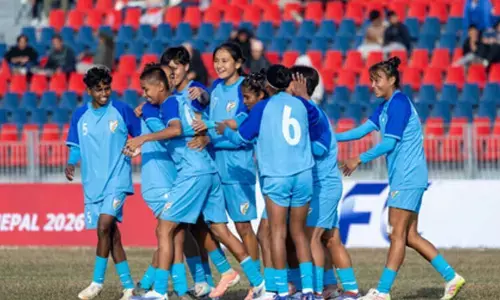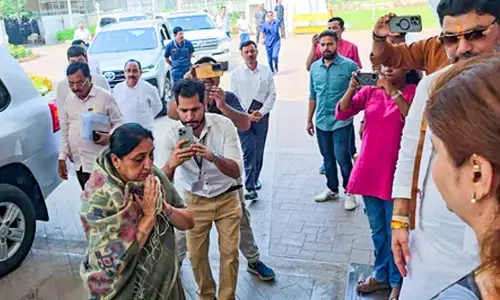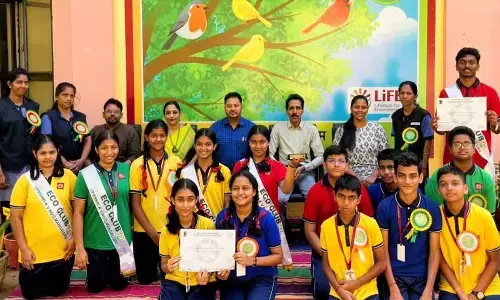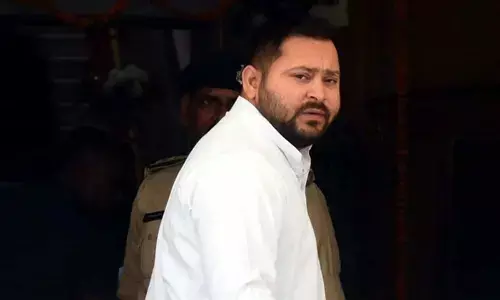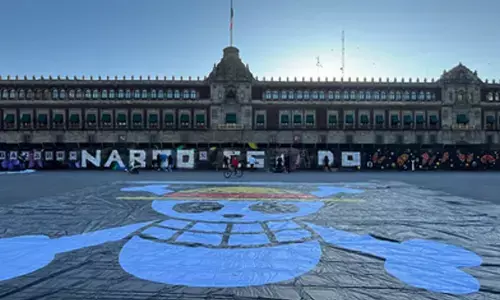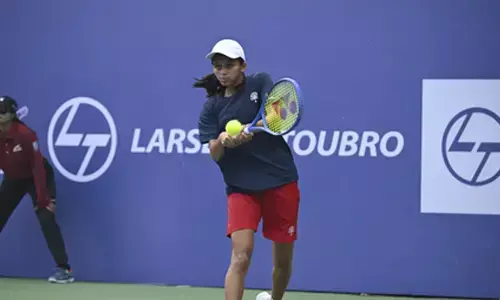MyVoice: Views of our readers 28th May 2023

Views of our readers
A tribute to a legend of the last century
When the great son of India Jawaharlal Nehru passed away on May 27, 1964, Dr Sarvepalli Radhakrishnan said, “Nehruji was one of the greatest figures of our generation, an outstanding statesman whose services to the cause of India’s freedom are unforgettable. His life and works have had a profound impact on our mental makeup, social structure and intellectual development.”
In fact, Nehruji was a multi-faceted personality. Though a champion of scientific advancement and rational approach to life, he did not downgrade the brighter aspects of religion but only criticised the meaningless ritualism and fanaticism associated with it. He delved deep into the Upanishads, the Gita and the Buddhist literature and drew solace from them in hours of stress and distress. In his Discovery of India, he mentioned the significance of a profoundly moving spiritual hymn from the Aitereya Brahmana which says, “Chairaiveti, Chairaiveti (Hence, O traveller, March along, March along).” In his will, while admitting that he had no religious sentiment, he says “I do not wish to cut myself off from the past tradition.....I am proud of the great inheritance that has been and is and I am conscious that, like all of us, am a link in that unbroken chain which goes back to the dawn of history in the immemorial past of India. That chain I would not break but treasure and seek inspiration from it.”
Nehruji’s uniqueness was that he not only strode the national scene like a colossus but also left his impress on the international scene. Such terms as “neutrality” and “neutralism” which smacked of a cowardly indifference or political timidity were strongly detested by him and he evolved a new concept called ‘Non-alignment’ along with other statesmen like Tito, Nasser and Nkrumah at a crucial juncture when the world was forced to adopt either of the political isms – Capitalism and Communism of the Superpowers. His Panchsheel which underlined respect for sovereignty, non-aggression, internal non-interference, mutual recognition of equality and development and peaceful coexistence contained the quintessence of non-alignment.
To Nehruji, socialism was not a mere political shibboleth or a utopian ideal. He knew that socialism would not cause a windfall of affluence or a sudden transformation of Indian society. He linked the concept of socialism with planning and wanted the latter to be imbued with content and meaning. He believed that democracy and socialism were not poles apart and that a synthesis of these called –‘’Democratic socialism – was adoptable to Indian conditions with no need to resort to Class War.’’ In fact, history bore witness to the fact of the integration of princely states and the abolition of Zamindari system without much resistance under the guidance of Nehru’s leadership. It is indeed a tribute to his breadth of vision and humanitarianism that in his dedication to building up a socialistic pattern of society, he was not tied down by any classified ideology.
True, in his understanding of socialism, he was deeply influenced by the European traditions and Marxism. Like any Marxist philosopher, he was aware that history was nothing but a record of perpetual struggle between “haves” and “have-nots” and that those classes who controlled the means of production would have their grip over economy and society. At the same time, he was actually conscious of the inapplicability of Marxism to the tradition bound Indian society and even found Marxism, as practised by its advocates, to be a dogma. To him “Socialism was not the spread of poverty but a function of abundance. So whatever form it might take in the affluent, industrialised West, the emphasis in India had to be laid on production before distribution. The prime effort had to be conversion of the stagnant economy which India had inherited in 1947 into a self-reliant, self-generating one.”
Nehru was a staunch upholder of parliamentary democracy. He hailed it as a government by discussion, debate and tolerance. He knew pretty well that the constitution ,as an instrument, could be amended but always stressed the responsibility or the accountability of the executive to the legislature’’ through formation of the executive under free and fair elections and above all respect for judiciary.’’
The foreign policy evolved by Nehru has stood the test of time. Immediately after independence, he proclaimed that India would not be “living in its own shell but rather the tolerant creative nationalism which believes in itself and the genius of the people, takes full part in the establishment of an international order…” No wonder, Nehru actively supported the freedom struggles of the oppressed countries from imperialistic and fascist rulers. Who else but a pure patriot like Nehruji could describe himself in his Will in such inspiring words as these “The Ganga round which are intertwined her racial memories, her hopes and fears, her songs of triumph, her victories.....has been a symbol of India’s age-long culture and civilisation, ever-changing, ever-flowing and ever the same.... A handful of my ashes should be thrown into the Ganga at Allahabad........I want the major portion of my ashes to be carried high up into the air in an aeroplane and scattered from that height over the fields where the peasants of India toil so that they might mingle with the dust and soil of India and become an indistinguishable part of India.”
– S M Kompella, Kakinada
9 yrs on, pain points persist, but is Modi to blame solely?
Apropos, "9 saal 9 sawaal as Modi government completes 9 years," (THI, May 27). With Prime Minister Narendra Modi completing nine years in office, the Opposition tried to land some solid punches on the ruling party. But, the performance of the government has been mixed. The economy had its troughs and crests, though it is now the world’s fifth largest economy, overtaking that of the United Kingdom.
The market capitalisation grew three-fold during the last nine years despite the Covid-induced slowdown. Digitisation, ramping up of rail, road and telecom infrastructure, and building an enabling ecosystem for startups led to the creation of over a hundred unicorns. Its mammoth operation of manufacturing and distributing free vaccines during Covid-19, distribution of free ration to over 80 crore poor people, free gas connections under the Ujjwala scheme, tap water connection to crores of households, and the direct cash transfer into farmers’ accounts have become vote catchers.
On the ideological front, too, the government sought to consolidate its base with the construction of a Ram temple in Ayodhya, the Kashi-Vishwanath Corridor and the Statue of Unity. Ticking the Hindutva checkbox by building a number of other religious circuits are right up there on the agenda.
As the government enters the last year of its current term, there are also concerns regarding the situation on the border with China. Unemployment is another pain point. Trouble is also brewing in the Northeast, now, violence has erupted in Manipur. Communication lines between the government and the Opposition have completely broken and as a result, Parliament’s productivity is abysmal.
– N Sadhasiva Reddy, Washington
The Congress party is posing these questions as if it had nothing to do with the present situation. This party ruled the country for over 55 years since independence and failed to develop it. Instead all it did was loot the people's money. Its leadership is good at coining slogans such as 'Roti Kapda aur makan,' 'Garibi Hatao,' 'Jai Jawan Jai Kisan,' etc., but all of them turned out to be hollow in nature. And this one "9 saal 9 sawaal" would also receive the same fate as the people would ignore that party and its antics because the NDA rule is far better than that of UPA and Congress in the country.Yet, it wants Narendra Modi to do miracles within 9 years. The first term of Modi was consumed by issues like debt clearance, enforcing fiscal discipline, etc. and during the second term the Covid-19 struck and devastated the economy, yet the country is standing on its own because of Modi's leadership. The Congress Party as well as all the opposition parties should wait for a reasonable period before launching movements against NDA.
– Govardhana Myneedu, Vijayawada
No Sunrise again for Hyderabad!
This one is for the management and coaching staff of SRH, who behave like ostriches, burying their heads in the sand. It is high time for Kavya Maran to let go of SRH.
The root cause of SRH’s woes is not cricket related. They are all related to the superegos of Kavya Maran, Brian Lara, Dale Steyn, and maybe even Muttiah Muralitharan. There is no long-term planning, and decisions are knee jerkish.
They pick up a great team and don’t back it. The team must be nurtured, especially the Indian talent. Players like Mayank Agarwal, Rahul Tripathi, Anmolpreet Singh, Abdul Samad, Umran Mallik, Abhishek Sharma, Kartik Tyagi, Nitish Kumar Reddy, Vivrant Sharma, and Mayank Markhande should be supported to the hilt.
SRH is very poor at retaining talent. It has released match-winning and dedicated players like David Warner, Rashid Khan, Bairstow, Nicholas Pooran, Trent Boult, Shikhar Dhawan, Ben Cutting, Jason Holder, Sandeep Sharma, Bipul Sharma, and many others.
Even players who did not do well at SRH, like Vijay Shankar and Wriddhiman Saha, are doing well at GT. The problem existed in the earlier franchise, the Deccan Chargers, too, where they released gems like Rohit Sharma, Adam Gilchrist, Andrew Symonds, Pragyan Ojha, and RP Singh, immediately after their title-winning campaign in 2009. Rohit Sharma, who was roped in by the Mumbai Indians, led them to five IPL titles and two CLT20 titles. Hyderabad indirectly contributes to other teams’ success.
SRH appears to be a B team from Chennai and is interested only in milking the franchise system. They are not interested in local talent and did not pick Tilak Verma, who now peddles his wares to Mumbai Indians.
They need to invest in players like Mayank Agarwal, Harry Brook, Rahul Tripathi, Umran Mallik, Klassen, Phillips, and Markram. It's not that they have a lot of choice.
Maybe next time around, Wahington Sunder will be fit and raring to go.
And Markram's captaincy was meek and unimaginative. Let him captain the SREC team in the SAT20 league, and maybe Klaasen or Bhuvaneswar Kumar would be a better choice for SRH. Groom Tripathi too. This season is done and dusted.
– Dr M Anil Ramesh, Hyderabad
THE OLD ORDER CHANGETH
"Change is the law of nature," they say. Everything around us undergoes some sort of mutability, sooner or later. Changes in some spheres make us wonder at the power of nature and at the imagination of man .But changes in other areas cause dismay and dread in us.
In the last few centuries, man has achieved wonderful advancement in every field of activity. In medicine science, technology, commerce, space technology, education, navigation, judiciary, administration, and even in warfare, man has got well-wrought and awe-inspiring changes for the progress, prosperity, and peace of all mankind. All this often reminds me of Shakespeare's insights into humanity in the play Hamlet: "What a piece of work is a man, how noble in reason, how infinite in faculty, in form and moving, how express and admirable, in action, how like an angel, in apprehension, how like a God! The beauty of the world, the paragon of animals." But, alas, many of us these days have changed not for better but for worse.
Most of us have become narrow minded, selfish as individuals, are always after material wealth, have become mundane in thought and in action, diabolic and indifferent. We have lost our heavenly and blissful innocence. Always ready to stoop down to any mean levels to satiate our carnal desires and snap all our human bonds for selfish ends. We have polluted all things, corrupted most institutions, doctored many practices, and watered down morals and virtues.
Here are a few pictures, cartoons, and thumbnail sketches that bring out the contrast between our hobbies, values, social customs and norms in the past and in the present. These pictures and their captions effectively tell us what we have lost and where we are heading to. To zenith or to nadir?
Change is definitely taking place but it is leading us into a cul-de-sac, into a vacuum where, as poet Matthew Arnold said, "We mortal millions live alone." Who can change the course of this catastrophic change in us, of us, and by us?
– M Somasekhar Prasad, Hyderabad
Fraudsters lurking on social media
Every day someone, somewhere across the country becomes a victim of online fraud. Recently, a businessman from Hyderabad lost 2 crore rupees in the guise of crypto currency. Fraudsters are mainly choosing social media like WhatsApp and Facebook for such scams.
They are sending links that you can earn more money with less investment, you can get salary if you work from home, you can recharge your mobile for free, you can buy mobile phones at a low price.
By clicking on it, they know all the details of our account and steal the money from the account.
All people, especially those living in rural areas, are advised to report such scams immediately to the phone number 1930 and not to open any links sent by unknown persons. Awareness should be created through V channels and voluntary organizations. Everyone should take it as a social responsibility.
– J M R Dunga, Amadalavalasa
Power of a vote
Mark Twain said, "In matters concerning religion and politics a man's reasoning powers are not above the monkey's." Though it has been decades since it was said, it applies to the present situation in India.
In North India, politicians try to immerse people in religious politics and when it comes to South India, people are engulfed by regional politics and linguistic politics too have their own role in moulding people. Most of the politicians at present are trying to win support of people by arguments based on emotional issues like religion, language, region rather than reason.
At present in India, except following their own ideology, no political party makes the interests and needs of people as their agenda. Almost all political parties are self-opinionated and consider themselves sanctimonious. Philosopher Groucho Marx said "Politics is the art of looking for trouble, finding it everywhere and applying wrong remedies." The part and parcel of politics is being kosher and disinterested and serving the people.
Politicians before elections are ready to promise the voters freebies, hike in reservation quota for some castes and minorities, remuneration for unemployed, etc. But no political party assures people to provide free and quality education and health. But, we must not believe their specious arguments. People must demand governments for education and health. To vote is not a perfunctory activity. We must not feel penitential after voting. We must elect the leader that leads us in good direction and elevates our standard of living.
– K Manoj Kumar, Huzurabad
On the occasion of completion of nine years in power by the BJP-led NDA government, the Congress party has raised nine questions and in the same way BJP had shown its achievements which are of political nature and a common man is least interested in these questions and answers. What they want to know is the solution to unemployment, inflation and economic growth of the country which are essential for the survival of a common man. It is the red signal for BJP for next elections as the public is not likely to be influenced by religious issues. At the end of the day, the think tank of BJP should introspect deeply and sincerely about the problems being faced by a common man and should not depend upon the false promises.
– Yash Pal Ralhan, Jalandhar
Food security implies quality produce, too
The projected record foodgrain output for the 2022-23 crop year in India is undoubtedly a highly commendable and positive development for the agriculture sector. It reflects the hard work of farmers, the expertise of scientists, and the favorable policies of the government. Achieving a record production despite challenges like unseasonal rains demonstrates the resilience and productivity of the agricultural community. A strong foodgrain output is crucial for ensuring food security and stability in the country. The increased production of key crops like rice, wheat, and maize, along with higher production of pulses and coarse grains, will contribute to meeting the food demands of the population and potentially reduce the need for imports.
To keep the agricultural sector growing and improve farming, we need to invest in research and development. This means finding better ways to do things and using new technologies. Farmers should have access to these modern methods and tools, as well as better infrastructure like irrigation systems and roads. They also need support in the form of loans and help selling their crops. By doing these things, we can help farmers be more successful and ensure that agriculture continues to improve. While celebrating the record production, it's important to focus on maintaining the quality of the produce. Meeting consumer demands for high-quality agricultural products is crucial for market competitiveness and improving farmers' income. This aspect should not be overlooked in the pursuit of higher yields. Overall, the record foodgrain output is a testament to the efforts put in by the agricultural community in India. It provides a strong foundation for sustainable agricultural growth and should be seen as an opportunity to further strengthen the sector for the benefit of farmers and the entire nation.
– Dr Krishna Kumar Vepakomma, Hyderabad
What should matter in new Parliament
What should be discussed in the country is not being discussed! The Manipur camp in north-east India continues to flare up, the RBI Governor himself says it is not possible to contain inflation right now, the World Economic Forum has said, that the employment of crores of people is going to decline and mass killing under the tutelage of a Christian priest in Kenya... these issues have no space for prime-time debates!
A weeklong discussion went into who should inaugurate the new parliament building and another week there was a discussion on the ‘sceptre'. The scepter and the royal seal are all part of the traditions and practices. They are not a benchmark for governance. No one cares where this scepter is when the administration goes well. But a large number of emotions are being whipped up over this royal wand.
The new parliament building should become a place of decision-making and not just a haven. In recent years, the functioning of the Indian Parliament is known only for debates, adjournments, and boycotts, such as a cacophony.
Without changing the behavior of the members and without proper discussions on public issues, it is useless to set up a new building with arbitrary decisions and no matter how many aspects of the affairs of the past proceed. 100% literacy, universal health care for all, proper representation of women in legislatures, fair, corruption-free elections are still elusive! Corruption, cronyism, caste, religious and regional identity are constantly haunting. The new building of Parliament should be used to frame and implement laws, through a comprehensive discussion, on these issues. Otherwise, it would be left like a monumental grave for the public representatives to visit occasionally.
– G Thirupathaiah, Hyderabad








